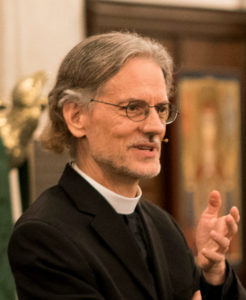To Change the World
“The future belongs to people with children, not with things,” wrote Charles Chaput in First Things a few months ago. If you are young and you want to change the world, counsels the Catholic archbishop emeritus of Philadelphia, then “get married, stay faithful to one another, have lots of children, and raise those children to be men and women of Christian character.”
The shape of this advice is familiar. On the one hand, we have the overwhelmingly vast landscape of cultural decadence. Seeing its depth and scope—from education to politics to business to media and on and on—we are at a loss as to how to begin to resist macro malign forces and contribute to their reversal. On the other hand, there is our home turf. Here it is possible to focus our energies, utilize our wealth, and embody virtues in how we live. What is done within the small frame of home, in fact, is of more lasting importance than what is ventured in the much vaster frame of society at large.
This familiar advice is not only true of homes. In the midst of a declining Church of England in the nineteenth century, one priest is remembered for declaring, “Should the Church of England fail, it will still be found in my parish.” The priest was John Keble. Despair would not overcome him; he had his home turf and he could work and be faithful to his calling there.
An interesting theological principle is called “recapitulation.” Fundamentally, it refers to the way all of human history converges in the person of Jesus. He is, for instance, the recapitulation of Adam. By extension, and of course in a more limited sense, there is a way in which a local scene (one’s home turf) can stand for the whole. When the government of ancient Israel was corrupt, the true tradition of the people was carried on through the prophets. When a church at large seems to lose its way, a local parish can continue in faithfulness.
And when the culture goes berserk, any one of us can still make a difference by attending to that which is within the compass of our household. We make a difference by being faithful to whatever vows we have made and lovingly diligent to whatever children we might be given.
Of course, although everyone is part of some sort of immediate society (even single people have neighbors and friends), not everyone’s immediate society is a family, not everyone is called to marriage, and not all married couples are given children. Furthermore, children are such only for a time. They grow up and become adults for whom their parents’ calling ceases to be rearing and turns into a form of friendship that might, in turn, include grandparenting. So, the call to change the world by having children is neither universal nor does it consume anyone’s entire life. But it is not for all that less significant. Every child is also a recapitulation of the human race and, truly seen, a new potential saint.
For most of us, the wise path in a crazy world is one that leads us to cultivate goodness close at hand. I had a bishop once who said the most creative thing that he had ever done was to rear his children. An academic privately retorted: “Of course, he never wrote a book!” The academic was wrong. Books, journals, online columns like this one—they all can help in the same way that even a wee bit of light is important in the darkness. But the future will be full of children.
Even as the ultimate future is full of saints.










